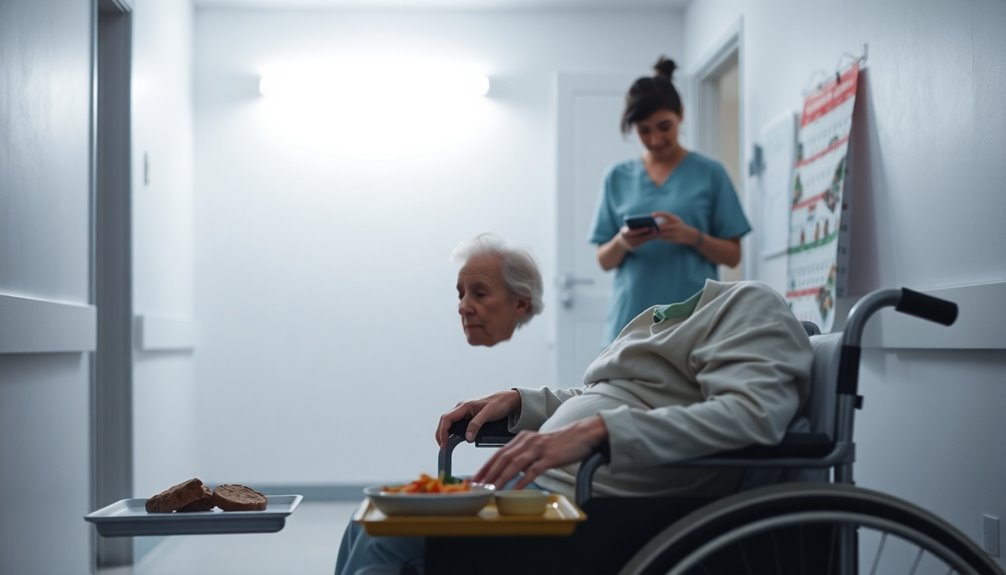When caring for the elderly, avoid assuming finances and end-of-life documents are in order; that could lead to complications later. Don't try to handle everything alone—it's important to seek support and share responsibilities. Failing to find suitable housing options or postponing vital conversations about health and care can lead to bigger issues down the line. Don't underestimate the risks of medication mismanagement or caregiver burnout either. Stay alert, and you'll discover more essential tips ahead!
Key Takeaways
- Failing to regularly review and update financial and end-of-life documents can lead to legal complications and financial burdens for your loved ones.
- Ignoring caregiver burnout signs can severely affect both the caregiver's well-being and the quality of care provided to seniors.
- Not involving elderly parents in housing and care decisions can lead to dissatisfaction and a lack of emotional support in their living arrangements.
- Overlooking regular health assessments and medication management increases the risk of health declines and adverse medication interactions.
- Avoiding difficult conversations about care preferences and estate planning can create stress and confusion, hindering effective communication and decision-making.
Assuming Finances and End-Of-Life Documents Are in Order

Have you ever assumed your elderly parents' financial and end-of-life documents are in order? Many caregivers make this mistake, only to face complications during crises.
It's crucial to verify that critical documents like wills, trusts, and powers of attorney are current and reflect their true wishes. Outdated end-of-life documents can lead to legal issues you don't want to deal with. Additionally, ensuring that their finances are organized can help avoid costly errors related to IRA inheritance rules. Understanding the potential for state taxes on IRA withdrawals is also essential for proper financial planning.
Familiarizing yourself with their finances, including debts and at-risk assets, helps protect against potential scams and guarantees necessary care expenses are covered. Additionally, understanding the importance of legal representation can provide support in navigating any potential complications that may arise.
Don't forget to regularly review insurance coverage to confirm it meets their current needs.
Trying to Handle Everything Alone

Many caregivers underestimate the toll of trying to manage everything on their own, often believing they can handle every task without help. This mindset can lead to caregiver burnout, affecting 40-70% of family caregivers. Ignoring your limits can result in physical and emotional exhaustion, causing symptoms like neglecting your own needs and increased irritability. Establishing clear rules about caregiving responsibilities can help prevent misunderstandings and promote a collaborative approach.
These strains can harm your relationships with your loved ones. It's essential to recognize that asking for assistance isn't a sign of weakness; it's a step towards better care. Involving family members or local caregiving services can ease your burden, enhance communication, and guarantee your elderly loved one receives the thorough care they deserve. Additionally, understanding the importance of long-term financial planning can help alleviate some of the stress associated with caregiving by ensuring that necessary resources are available when needed. Creating a supportive environment that encourages collaborative caregiving can significantly improve the overall experience for both caregivers and seniors.
Failing to Find Appropriate Housing Options

Finding the right housing option for elderly parents can be challenging, but it's essential for their well-being. You have various housing options, such as assisted living facilities, long-term care homes, and independent living communities.
Each option caters to different levels of care and independence, so it's imperative to research and evaluate which best meets your aging parents' needs. Consider amenities, services, and costs, and prioritize proximity to healthcare services and social activities for their safety and quality of life.
Involving your parents in the decision-making process not only helps them feel respected but also eases their change.
Finally, assess potential modifications like wheelchair accessibility to accommodate future care requirements as they age.
Putting Off Difficult Conversations

Avoiding tough conversations about your loved ones' care can create unnecessary tension later on.
By scheduling regular family meetings and fostering open dialogue, you can address important topics like healthcare preferences and estate planning while everyone is still healthy.
If needed, consider bringing in a professional mediator to help facilitate these discussions and guarantee everyone feels respected.
Importance of Open Dialogue
While it might be tempting to postpone difficult conversations about health preferences and estate planning, doing so can create unnecessary anxiety and confusion for both seniors and their families.
Embracing open dialogue is essential to guarantee everyone feels heard and valued. Here are three reasons to address these topics early:
- Fosters Trust: Open discussions strengthen relationships and build trust between seniors and their families. Additionally, consistent communication is key to maintaining strong connections throughout the aging process. Furthermore, establishing advance directives early can guide medical decisions when individuals are unable to communicate.
- Empowers Decisions: Involving seniors in their care choices enhances their quality of life.
- Reduces Conflict: Addressing concerns proactively minimizes misunderstandings and emotional turmoil later. Additionally, open communication about health and personal preferences enables families to better support seniors during challenging times.
Scheduling Family Meetings
Scheduling family meetings can be a game-changer when it comes to discussing elderly care; these gatherings provide a platform for addressing preferences, needs, and concerns.
By holding regular meetings, ideally once a month, you guarantee that every family member stays informed and engaged in the caregiver's journey. This open dialogue helps prevent misunderstandings and conflicts down the line. Additionally, successful co-parenting strategies can be beneficial in maintaining harmony during these discussions.
Prepare emotionally for these conversations, as they often touch on sensitive topics like estate planning and healthcare decisions. Creating a calm, respectful environment encourages your elderly parent to voice their opinions, leading to better care decisions.
Don't put off these important discussions; delaying them can increase stress and confusion for everyone involved, ultimately compromising the quality of care provided. Additionally, building a support network among family members can significantly enhance the decision-making process and emotional well-being of all involved.
Hiring Professional Mediators
When difficult conversations about elderly care loom on the horizon, hiring a professional mediator can be a smart choice to help navigate these sensitive discussions.
Mediators foster open dialogue about critical topics like healthcare preferences and estate plans, reducing family conflict.
Here are three reasons to contemplate this support:
- Neutral Perspective: Mediators provide an unbiased viewpoint, allowing everyone to express their feelings without escalating tensions.
- Improved Family Harmony: Engaging a mediator can lead to clearer decision-making, ensuring your elderly parents' wishes are respected.
- Reduced Emotional Distress: Families utilizing mediation often reach consensus more quickly, easing the burden on all involved.
Don't put off these essential conversations—invest in caregiver support to foster understanding and peace within your family.
Being Unprepared for Aging Challenges

When it comes to aging challenges, being unprepared can lead to serious complications.
You need to guarantee essential documents are organized, have a clear care plan in place, and assess financial readiness to avoid unexpected costs. Additionally, ensuring your loved ones have access to high-quality protein sources can support their overall health during this critical stage.
Proactive planning now can save your family a lot of stress later.
Essential Document Organization
While it may seem easy to put off organizing essential documents, being unprepared can complicate healthcare and financial decisions as your loved ones age.
Without proper essential document organization, you risk facing unnecessary stress during critical times.
Consider these significant documents to gather:
- Wills and Trusts – Confirm your loved one's wishes are honored.
- Powers of Attorney – Designate trusted individuals for healthcare and financial decisions, as this is crucial for navigating legal complexities during emergencies. Establishing a holistic approach to care can help in making comprehensive decisions that honor your loved one's needs.
- Medical Records and Insurance Information – Keep them accessible for seamless care coordination.
Establish a centralized folder with all relevant legal documents, financial records, and medical information.
Regularly review and update these materials, especially after major life changes, so they reflect current circumstances and wishes, preventing chaos when you need clarity most. Additionally, consider involving a professional to help navigate emotional volatility during this process, ensuring that decisions are made thoughtfully and effectively.
Future Care Planning
Future care planning is vital to avoid common mistakes that can complicate your loved ones' lives. Start by discussing healthcare preferences and living arrangements with aging parents; open communication can prevent misunderstandings later. Don't wait too long to explore housing options like assisted living or in-home care, as urgent needs can leave families scrambling for solutions. Also, make sure to evaluate care plans and resources regularly; ignoring this can compromise the quality of care. Finally, understand insurance coverage and long-term care options early on to avoid financial strain and unmet health requirements. Creating a retirement savings plan can also play a crucial role in ensuring financial security for aging individuals. Being proactive now can lead to smoother shifts in the future.
Financial Readiness Assessment
Being unprepared for the financial challenges of aging can lead to significant stress and hardship for both seniors and their families.
You must guarantee financial preparedness to avoid pitfalls that can impact your loved ones. Here are three crucial areas to focus on:
- Gather essential documents: Wills, trusts, and powers of attorney are crucial for managing affairs effectively.
- Discuss end-of-life planning: Nearly 40% of families skip this conversation, leaving them vulnerable to unexpected financial burdens.
- Review insurance coverage: With 70% of seniors needing long-term care, guarantee you're not among the 85% without insurance.
As a family caregiver, taking these steps now can safeguard your family's future and protect your loved one from financial exploitation.
Ignoring Regular Health Assessments

Ignoring regular health assessments can be a costly mistake for elderly individuals and their caregivers.
These evaluations are fundamental for identifying emerging health issues early, especially since nearly 80% of older adults have at least one chronic health condition. By scheduling annual wellness visits, you can monitor critical signs and manage chronic diseases effectively, which contributes to better overall health outcomes.
Without these assessments, you risk a decline in functional abilities and quality of life, as untreated ailments may progress unnoticed. Engaging in preventive health screenings like blood pressure and cholesterol checks can help you manage risks associated with aging.
Don't overlook the importance of regular health assessments; they're indispensable for maintaining health and longevity in your golden years.
Neglecting Medication Management

When it comes to medication management, staying organized is key.
You can use medication tracking systems and schedule regular reviews with healthcare providers to guarantee your loved ones take their medications correctly.
Medication Tracking Systems
Neglecting medication management can lead to serious health consequences, so it's essential to stay organized. Implementing a medication tracking system can greatly improve adherence to prescribed treatments.
Here are three effective strategies to evaluate:
- Pill Organizers: These help you sort medications by day and time, reducing the risk of missed doses.
- Digital Reminders: Set alarms on your phone or use apps specifically designed for medication management.
- Daily Schedules: Establishing a routine for taking your medications can enhance consistency and overall health.
With studies showing that nearly 50% of elderly patients don't take their medications as prescribed, using these systems within your healthcare system is critical for best treatment outcomes.
Don't let missed doses jeopardize your health!
Regular Medication Reviews
Medication tracking systems provide a solid foundation for managing health, but they're only part of the equation. Regular medication reviews are essential, especially since nearly 40% of older adults take five or more medications. This practice reduces the risk of adverse drug interactions and improves health outcomes.
| Importance | Benefits |
|---|---|
| Regular Reviews | Enhance adherence rates |
| Updated Medication List | Prevent harmful duplications |
| Consultations | Identify unnecessary medications |
| Adjust Dosages | Reduce hospital admissions |
Engaging in routine consultations with healthcare providers guarantees that medication management is effective. By keeping an updated list of medications, you can coordinate care and avoid complications, ultimately leading to better health outcomes. Don't overlook the power of regular medication reviews!
Disregarding Safety Measures

Safety measures are essential for seniors, especially as they face unique challenges that can jeopardize their well-being. Ignoring these safety precautions can lead to devastating consequences.
Here are three critical areas you must prioritize:
- Home Modifications: Remove scatter rugs and improve lighting to prevent falls, as over 30% of seniors experience at least one fall each year.
- Driving Assessments: Regular evaluations with a family physician guarantee that your loved one remains safe on the road, protecting all road users.
- Medication Management: Nearly 50% of seniors mismanage medications, risking severe health complications.
Overlooking the Importance of Open Communication

While it may seem easy to overlook, open communication is essential in providing effective care for seniors. It fosters trust and cooperation between caregivers and seniors, allowing you to better understand their individual needs and preferences.
Regular discussions about health, preferences, and care plans prevent misunderstandings, ensuring seniors feel heard and respected in their decisions.
Consider hosting monthly family meetings to facilitate ongoing dialogue—this helps address concerns early and adapt care strategies as needed.
Engaging seniors in conversations about their care not only empowers them but also boosts their emotional well-being and sense of control over their lives.
Underestimating the Risk of Caregiver Burnout

Caregiver burnout is often underestimated, yet it can severely impact both the caregiver and the senior receiving care.
When you neglect self-care, you risk falling into a cycle of physical and emotional exhaustion. This not only affects your well-being but also the quality of care you provide.
Consider these essential points:
- 40-70% of family caregivers experience burnout, leading to chronic fatigue and anxiety.
- Caregivers who don't prioritize self-care are twice as likely to rate their health as poor.
- Regular breaks and support groups can meaningfully reduce feelings of isolation and improve mental health.
Frequently Asked Questions
What Are Things a Caregiver Should Not Do?
As a caregiver, you shouldn't assume everything's in order with your elderly parent's finances or end-of-life documents.
Don't try to tackle all responsibilities alone; it can lead to burnout.
Avoid overlooking suitable housing options that match their needs, and don't delay those tough conversations about health care and living arrangements.
Finally, make sure you organize essential documents like wills and medical records to prevent unnecessary stress when it matters most.
How to Deal With a Difficult Mother Who Is Elderly?
Dealing with a difficult elderly mother requires empathy, patience, and clear communication.
You'll want to listen actively, understand her emotions, and involve her in decisions about her care.
It's essential to address her fears and feelings, fostering a sense of independence.
If discussions become tense, consider a neutral mediator to ease the conversation.
Regularly checking in on her mental well-being not only supports her but also helps you manage your own stress effectively.
Can I Take Care of the Elderly in My Home?
Yes, you can take care of the elderly in your home! It offers a familiar space that can enhance their comfort and emotional well-being.
Just make sure to assess your home for safety hazards, manage medications carefully, and coordinate care with healthcare providers.
Involving family members can also help share the responsibilities and reduce stress.
With thoughtful planning, you can create a supportive environment that meets their needs effectively.
What to Do When You Can No Longer Care for an Elderly Parent?
When you can no longer care for your elderly parent, it's important to assess their needs first.
Involve them in the decision-making process to prioritize their comfort and preferences.
Research and visit various care facilities to find the right fit.
You might also consider hiring a geriatric care manager to help coordinate options.
Don't forget to prepare legal documents like a power of attorney to guarantee their wishes are respected in future decisions.
Conclusion
Avoiding these critical mistakes in elderly care can make all the difference in your loved one's quality of life. Don't let the challenges of aging sneak up on you like a rogue Wi-Fi signal—stay proactive and informed. Embrace open communication, seek help, and prioritize safety and health management. By doing so, you'll not only enhance their well-being but also your own peace of mind. Remember, teamwork makes the dream work when it comes to caring for seniors!









